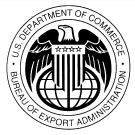
|
Bureau of Export Administration
| |
| (Washington) The Commerce Department today
published regulations in the Federal Register to implement the change in
U.S. export controls on computers announced by President Clinton on July
1. Easing control limits on High Performance Computers (HPCs) will promote
our national security, enhance the effectiveness of our export control
system, and ease unnecessary regulatory burdens on both industry and
government.
Today's announcement is the third revision to U.S. export control parameters since President Clinton took office in 1993 and reflects this Administration's efforts to ensure effective controls on militarily sensitive technology while taking into account the increased availability of commodity products, such as servers and workstations, of which millions are manufactured and sold worldwide every year. The Revised Controls The regulations revise controls as announced by the President and maintain the four country groups announced in 1995. They amend the countries in, and control levels for, those groups as follows: Tier I (Western Europe, Japan, Canada, Mexico, Australia, New Zealand): License exception available for all computers (i.e. no prior government review, but companies must keep records on higher performance shipments that will be provided to the U.S. government as directed). Today's regulation moves Hungary, Poland, the Czech Republic and Brazil from Tier 2 to Tier 1. Tier II (the rest of South America, South Korea, ASEAN, Slovenia, South Africa): License exception available for computers up to 20,000 MTOPS with record-keeping and reporting as directed; individual license (requiring prior government review) above 20,000 MTOPS. Tier III (India, Pakistan, Israel, China, Russia, and 44 other countries): The regulations maintain the current two-level system for civilian and military/proliferation end-users, and raise the individual licensing levels for both classes of end-users, from 2000 to 6500 MTOPS for military end-users and from 7000 to 12,300 MTOPS for civilian end-users. The regulation will immediately raise the license level for civilian end-users, and will raise the license level for military end-users in six months, at the same time it adjusts the level that triggers the NDAA notification requirement. Companies are currently required to provide the Commerce Department with prior notice of exports for systems above 2,000 MTOPS to all Tier 3 end-users. The Commerce Department, in consultation with other reviewing agencies, has 10 days to inform the company if a license is required. The six month delay in raising the license levels for military end users and notifications for civilian end users is a result of congressional requirements under the National Defense Authorization Act for Fiscal Year 1998 (NDAA), P.L. 105-85. Tier IV (Iraq, Iran, Libya, North Korea, Cuba, Sudan, and Syria). There are no planned changes for Tier IV; current policies continue to apply (i.e. the United States will maintain a virtual embargo on computer exports). For all these groups, re-export and re-transfer provisions continue to apply. The regulations do not affect the implementation of the Enhanced Proliferation Control Initiative (EPCI), which provides authority for the government to block exports of computers of any level in cases involving exports to end-uses or end-users of proliferation concern or risks of diversion to proliferation activities. Criminal as well as civil penalties apply to violators of the EPCI. In addition, the Department of Commerce will continue to add to its list of published entities of concern as a means of informing exporters of potential proliferation and other security risks. The Department will remind exporters of their duty to check suspicious circumstances and inquire about end-uses and end-users. Exporters will be advised to contact the Department of Commerce if they have any concern with the identity or activities of the end-users. |